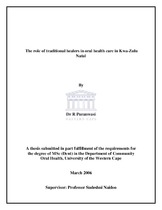| dc.contributor.advisor | Naidoo, Sudeshni | |
| dc.contributor.author | Puranwasi, Randhir | |
| dc.contributor.other | Dept. of Community Oral Health | |
| dc.contributor.other | Faculty of Dentistry | |
| dc.date.accessioned | 2013-08-20T11:29:37Z | |
| dc.date.available | 2007/07/03 13:13 | |
| dc.date.available | 2007/07/03 | |
| dc.date.available | 2013-08-20T11:29:37Z | |
| dc.date.issued | 2005 | |
| dc.identifier.uri | http://hdl.handle.net/11394/1954 | |
| dc.description | Magister Scientiae Dentium - MSc(Dent) | en_US |
| dc.description.abstract | A qualitative study was carried out to assess the role of traditional healers in oral health care in Kwa-Zulu Natal province, South Africa. The aim and objectives of the study were to assess the oral care knowledge and practices among traditional healers, to determine the extent to which traditional healers can diagnose oral conditions and how they could be used in the provision of primary health care and prevention of the spread of HIV infection. Another objective was to use the information collected to serve as a guide for collaborative oral disease prevention programme development.Three categories of traditional healers were identified in the sample: Isangomas, Nyangas and Umthandezelis. The average age of the sample was 45 years and the majority was female. Most healers were in training for between eight months and ten years. All traditional healers reported seeing patients with oral diseases and 93% reported that they referred patients elsewhere for additional help. All healers treated their patients with natural remedies. Seventy three per cent of the sample reported that they treated patients with HIV/AIDS. Less than 30% of the sample knew that AIDS was caused by a virus and 47% reported being ‘told’ by the ancestors whether an oral disease was HIV/AIDS.In this study traditional healers were shown a series of ten photographs of common oral diseases and oral HIV lesions and asked to identify as many lesions as possible. Following basic training and education about the causes and diagnostic features of the lesions, 100% of traditional healers were then able to identify aphthous ulcers, 80% Kaposi's sarcoma and 73% could recognize cancer of the tongue. These results showed that given proper education, traditional healers could play an important role in early detection of not only the common oral diseases but also the oral manifestations of HIV/AIDS. In addition, most traditional healers are skilled in interpersonal relations and if provided with the correct information they could be very effective as AIDS councilors.The traditional healers demonstrated good knowledge of the transmission, risk groups and prevention strategies for HIV/AIDS and they could serve as an important resource of information and should be incorporated in community based AIDS prevention and other programmes. | en_US |
| dc.language.iso | en | en_US |
| dc.publisher | University of the Western Cape | en_US |
| dc.subject | Traditional healers | en_US |
| dc.subject | Oral health | en_US |
| dc.subject | Kwa-Zulu Natal | en_US |
| dc.title | The role of traditional healers in oral health care in Kwa-Zulu Natal | en_US |
| dc.type | Thesis | en_US |
| dc.rights.holder | University of the Western Cape | en_US |
| dc.description.country | South Africa | |

